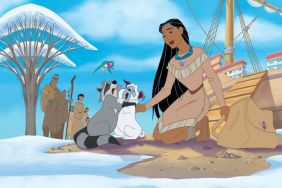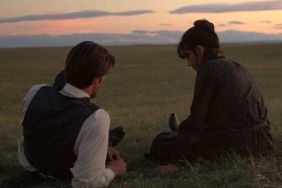Colin Farrell as John Smith
Q’Orianka Kilcher as Pocahontas
Christian Bale as John Rolfe
Christopher Plummer as Captain Christopher Newport
Ben Chaplin as Jehu Robinson
Noah Taylor as Selway
David Thewlis as Captain Edward Wingfield
Wes Studi as Opechancanough
August Schellenberg as Powhatan
Myrton Running Wolf as Tockwhogh
Raoul Trujillo as Tomocomo
Josh Padgett as Joshua
Ben Mendelsohn as Ben
Jeremy Radin as Jeremy
Jeremy Wade as Jeremy
Yorick van Wageningen as Captain Argall
Will Wallace as William Sentry
Alex Rice as Patowomeck’s Wife
Review:
In 1607, Christopher Newport (Christopher Plummer) landed his ships off the coast of Virginia while on a quest for the illusive (and ultimately illusory) route to the Indies, and instead founded the colony of Jamestown, the first English colony in America. Life in the new world proved harder than expected and Newport returned to England for supplies, leaving the colony in the hands of Captain John Smith (Colin Farrell) who, while trying to trade for goods with Emperor Powhatan (August Schellenberg) of the Algonquin, met and fell in love with the chief’s teenage daughter, Pocahontas (Q’orianka Kilcher). When the English and the Algonquin fell to war, Pocahontas aided John Smith with supplies and warning of attack, ensuring both the colony’s survival and the loss of her own tribe, as her family cast her out and sent her to live with the English.
The story of Pocahontas is one of the turning points of America, leading both to the establishment of the colonies, and taking the first steps to what became the near eradication of Native American culture. She is seen alternately as a savior and a betrayer, but there is no denying she is a central figure in American history, and is all the more intriguing because what she did, she did for love.
And that is the essence of Terrence Malick’s new film. It stretches out on both sides of the Atlantic, trying to show the truth of the English landing in Virginia, and the reactions (ranging from awe to greed) of the people involved when they come to their new worlds – John Smith to America, and later, Pocahontas and Opechancanough (Wes Studi) to England – and come separately to the conclusions that the world they had been living in was much smaller than they had thought.
At its heart, though, it is a romance, and a romance done in the poetic cinema style Malick has been moving towards since his return to active filmmaking. Naturally, because it’s a Terrence Malick film, “The New World” is beautiful to look at, which is good, because on the surface beautiful pictures are almost all that you’re going to get.
It is pure cinema – story and emotion are told through the connections of images rather than through dialogue. It may be very difficult for the casual filmgoer to take in – the actor’s speak so rarely that it’s almost unnerving when they do talk, more often occasionally voicing their thoughts through internal monologue.
Everything is internalized, but for all that, the emotions are vivid on the screen. In almost any other director’s hands it would be incredibly pretentious, but Malick makes it work almost effortlessly. Each sparse image becomes loaded with information; the simple clasping of hands between two people standing apart tells more than a drawn out, dialogue heavy scene could.
As focused he is on the visuals of the film, Malick also uses sound and especially music as powerful emotive elements, often pushing composers to their best work, and “The New World” is no exception of that either. James Horner presents one his best scores ever, only occasionally falling back on old devices.
The cast is superb throughout, but it is Q’orianka Kilcher as Pocahontas that makes the story turn. The film starts out entirely from Smith’s point of view – it is some time before he and Pocahontas actually meet – but when she does arrive it slowly moves over to become entirely her film, and feels only natural in doing so, following her heartbreak when Smith leaves and her acceptance of her new life when she marries John Rolfe (Christian Bale) and moves to England to be introduced to the court of King James (Jonathan Pryce). Some of the films most indelible moments are set there, as members of her father’s delegation encounter European culture for the first time – as a new a world to them as America was to Europeans – and gazing upon the monstrous stone structures and exquisitely sculpted gardens, realize what the civilization bearing down on them is and perhaps get a glimpse of their future. It’s there that John Smith returns to Pocahontas’ life and forces the choice between love and duty on her a second time.
Not Malick’s best film, but more than up to his usual high standards, “The New World” is a powerful and emotional romantic drama, and an essential story in the history of America.
“The New World” is rated PG-13 for some intense battle sequences.










